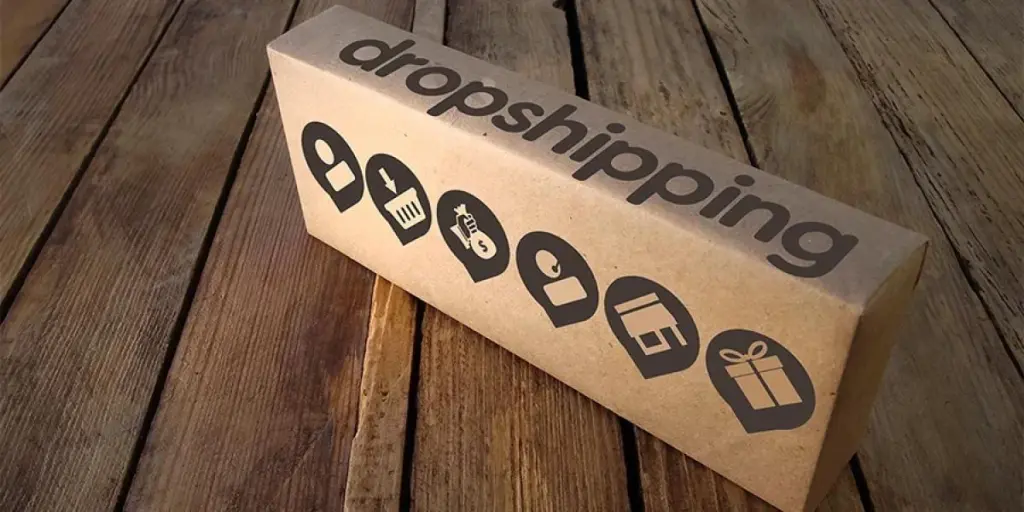The online shopping world is fast-moving and massive, with new shopping methods popping up everywhere. But while many don’t stick, two names always stand out: Alibaba.com and Temu.
Alibaba.com has been around since 1999 and is well-established, while Temu is much newer but has quickly made a name for itself.
Both eCommerce platforms offer a huge range of products, making it tough for buyers to decide which one to use. But make no mistake, while both platforms offer amazing product varieties, they have clear differences that keep them apart. Keep reading to explore the differences between these online marketplaces.
Table of Contents
Alibaba.com vs. Temu: How they’re different in 7 categories
1. Alibaba.com vs. Temu: What are their business models?
2. Alibaba.com vs Temu: How wide are their product ranges & categories
3. Alibaba.com vs. Temu: Which offers better deals and lower prices?
4. Alibaba.com vs. Temu: Which has a better interface?
5. Alibaba.com vs. Temu: How do they handle shipping and delivery?
6. Alibaba.com vs. Temu: How does dropshipping work on both platforms?
7. Alibaba.com vs. Temu: Who offers better return policies?
Final thoughts
Frequently Asked Questions
1. What is the difference between Temu and Alibaba?
2. Is it risky to buy from Alibaba?
3. Does Temu ship directly from China?
Alibaba.com vs. Temu: How they’re different in 7 categories
1. Alibaba.com vs. Temu: What are their business models?

Alibaba.com primarily operates as a B2B (business-to-business) platform, connecting global buyers with suppliers for wholesale transactions, custom manufacturing, and long-term sourcing partnerships.
Temu, on the other hand, is all about selling directly to everyday shoppers. It designed its platform to help buyers order trendy gadgets or shoes with just a few clicks and fast delivery. While you can still buy in bulk or resell items from Temu, the platform mostly targets personal shopping experiences, not big business deals.
2. Alibaba.com vs Temu: How wide are their product ranges & categories
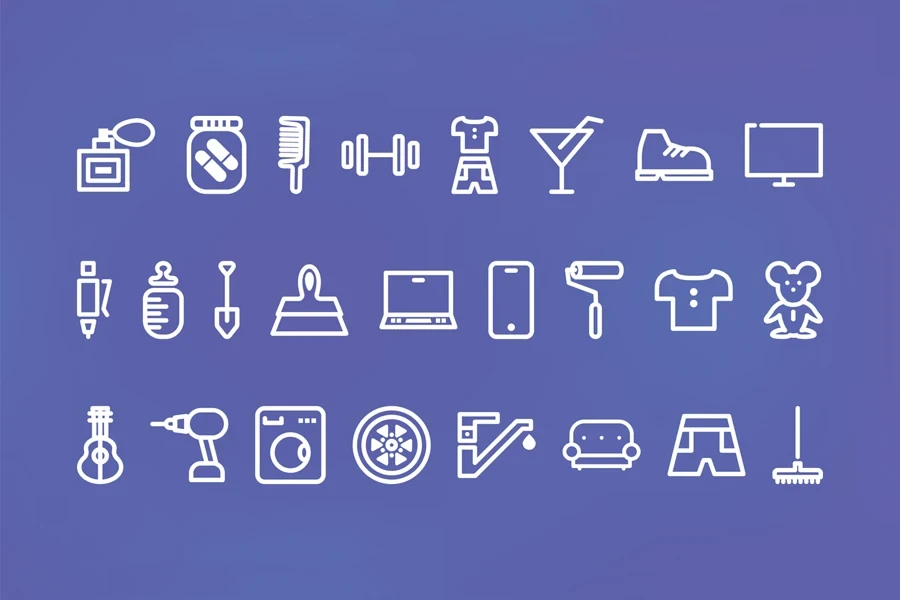
There’s almost nothing you can’t find on Alibaba.com. From specialized industrial equipment to custom-branded stationery, the sheer variety is staggering (hundreds of millions of products in the market after over 20 years). You’ll also find more than 200,000 suppliers for common categories like electronics, apparel, home goods, etc.
Since Alibaba.com is mainly set up for businesses, buyers can order in large quantities, which makes it great for bulk deals. Because it connects you directly with manufacturers, it’s a treasure trove for businesses looking to source products under one digital roof.
In contrast, Temu’s catalog leans on current consumer trends. Whether it’s the latest phone accessory, a cute mini-vacuum making waves on TikTok, or a new skincare gadget, you’ll likely see it highlighted on Temu.
The platform regularly adds fresh items, making it feel like a virtual pop-up market that always refreshes its stock. Though Temu boasts over a million products in categories like jewelry, consumer goods, fashion, and home decor, it can’t match Alibaba.com’s sheer variety.
3. Alibaba.com vs. Temu: Which offers better deals and lower prices?
Both Alibaba.com and Temu are popular for their rock-bottom prices. However, how they handle their pricing strategies is where things get different.
Alibaba.com’s B2B focus often means you can negotiate directly with suppliers and get competitive prices for bulk purchases. Larger orders can translate to big per-unit discounts, which is a dream for business owners. Temu, on the other hand, focuses more on pushing deals for single-item purchases, which can be slightly higher.
While both platforms offer discounts that push the prices down even more, Temu is more aggressive with the deals. Flash sales, promo codes, 90% off coupons, and seasonal discounts make it feel like you’re always catching a special offer.
4. Alibaba.com vs. Temu: Which has a better interface?
One look at both platforms, and you’ll see Alibaba.com uses a more classic marketplace design, while Temu goes the sleek and modern route. Nevertheless, navigating both platforms is simple, with organized filters and listings to ensure users find what they want. Let’s take a look at the homepages—here’s what Alibaba.com looks like:
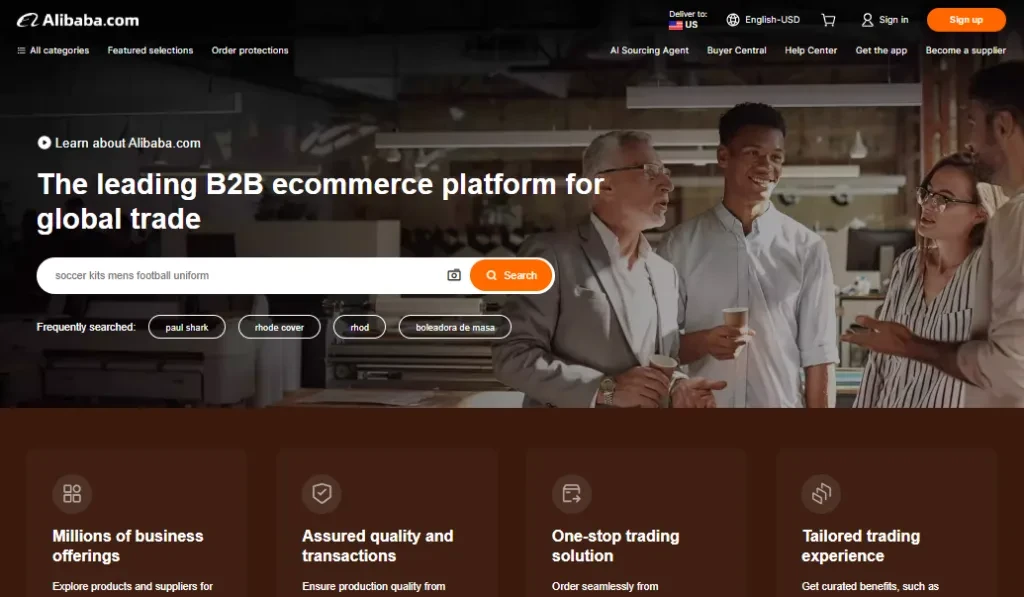
Alibaba.com’s home page feels like it has one goal: to be the best and most comprehensive trading platform. It spotlights trust factors like quality assurance and support to encourage a more confident shopping experience. Even the listings show verified badges, trade assurance logos, factory sourcing information, and more.
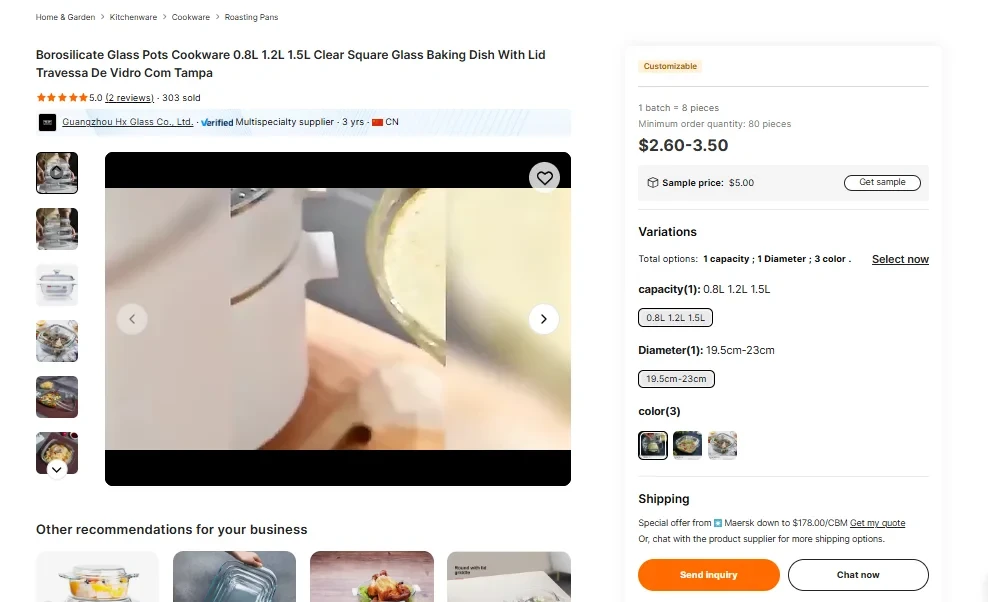
Even scrolling through Alibaba.com’s pages will show you tons of helpful information. Immediately, you’ll spot all the basic product details (MOQ, bulk pricing, variations, shipping, protections, and customer reviews). Then, scrolling some more will show you more about the seller and the product.
Note: Clicking on the seller’s name will take you to their profile, where you can learn more about them. For example, you can see if they have registered trademarks, factory specifics, or other product offerings.
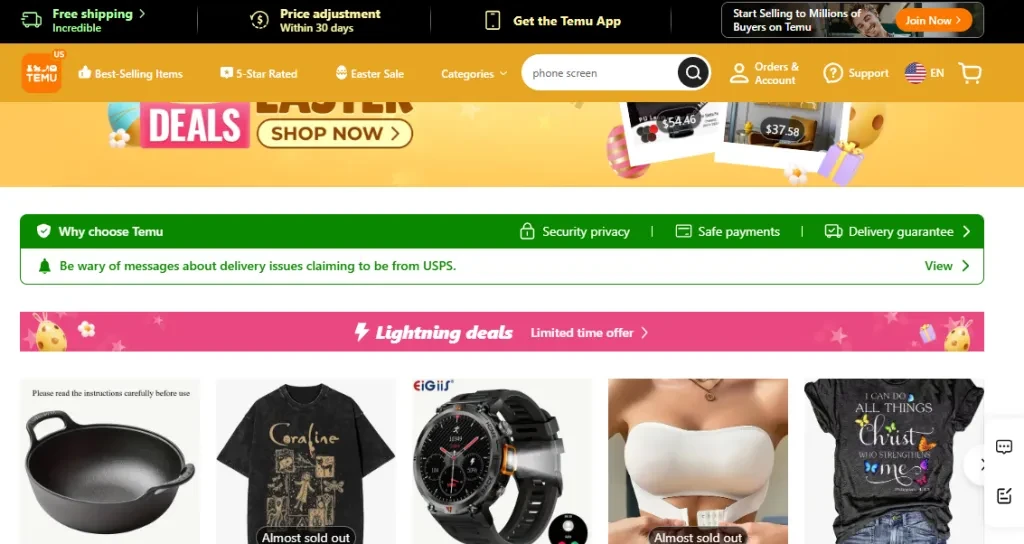
On the other hand, Temu’s homepage has sections for discounts, top deals, and featured products. This design choice makes it easy for users to discover the latest offers at a glance.
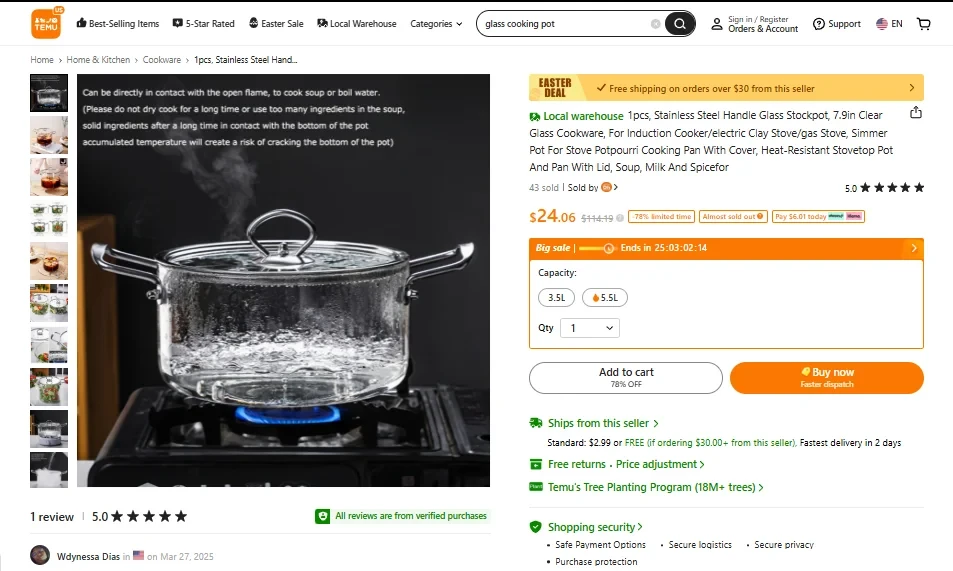
This simple design also extends to their product pages. Temu shows everything cleanly and straightforwardly, making it easy to spot important details like availability, discount, shipping (free or not), customer ratings/reviews, and product specifications.
5. Alibaba.com vs. Temu: How do they handle shipping and delivery?
Fast and reliable shipping is a big deal for customers, and Alibaba.com and Temu handle it differently. Alibaba, for instance, has more complex shipping policies. Since it’s a business-to-business (B2B) platform, shipping usually involves sending the full minimum order quality (MOQ) to one address in one shipment.
For this reason, you’ll have to work with the supplier to sort out the shipping details and costs. Some suppliers may not want to deal with shipping for smaller orders since it may not be worth the effort. The good news is that many of them are open to connecting you with a dropshipping agent who takes care of that part for you.
On the other hand, Temu provides two shipping options:
- Standard shipping, which is free on almost all orders and usually takes between 5 to 12 days
- Express shipping is more expensive ($12.90 per order). However, Temu makes it free if you spend over $129. More importantly, delivery takes about 4 to 10 days.
Something interesting to note is that if the order shows up late, Temu will give you some credit as a small thank-you for your patience. Also, some sellers store items in local warehouses, meaning your order could arrive much faster.
6. Alibaba.com vs. Temu: How does dropshipping work on both platforms?
While you can buy products from Temu and resell them, the platform doesn’t officially support dropshipping or have any special tools or programs designed for it. On the other hand, Alibaba.com is very dropshipper-friendly and offers plenty of support and features to help you build a dropshipping business.
AliExpress was one of the first to offer tools for dropshippers with its Dropshipping Center, but Alibaba.com has made great progress, too. Many suppliers on Alibaba.com have lowered their minimum order quantities (MOQs) to a single item, making it easier for anyone to start selling.
Here’s a fun fact: You can find products and reliable suppliers, quickly import those products into your online store, and manage orders more smoothly. If you’re using Shopify, check out our step-by-step guide on how to dropship from Alibaba.com to Shopify to streamline the entire process
7. Alibaba.com vs. Temu: Who offers better return policies?
When it comes to return policies, Alibaba.com and Temu offer different approaches aligned with their target users—business buyers and individual consumers.
Temu allows returns within 90 days for most items, with exceptions such as worn clothing, groceries, personal care items, and customized products. Electronics may have shorter return windows, depending on the seller. The first return per order is free, while additional returns may incur shipping fees.
Returns on Alibaba.com are managed through its Trade Assurance program, which offers buyer protection when products don’t meet agreed-upon terms. Eligible refund requests can typically be made within 30 to 60 days, depending on the buyer’s membership level. Refund decisions are based on platform-verified order terms and communication history, and Alibaba.com may mediate disputes between buyers and suppliers.
Final thoughts
Ultimately, the choice depends on your priorities. Alibaba’s scale, protections and B2B nature can be invaluable for a small business or side hustle. However, if you’re looking to purchase items for yourself and want them delivered within a reasonable timeframe without jumping through hoops, Temu is a perfectly good option.
Frequently Asked Questions
1. What is the difference between Temu and Alibaba?
Temu is a B2C platform focused on low-cost products for individual shoppers, while Alibaba.com is a B2B marketplace designed for bulk buying and global trade between businesses.
2. Is it risky to buy from Alibaba?
No. Alibaba has established guidelines to protect brand rights and combat counterfeit products on its platform. Still, buyers need to stay alert. If you spot anything suspicious or possibly fake, report it to help keep the marketplace safe and trustworthy for everyone.
3. Does Temu ship directly from China?
Yes, Temu primarily ships directly from China, although some products may ship from local warehouses in select countries for faster delivery.



